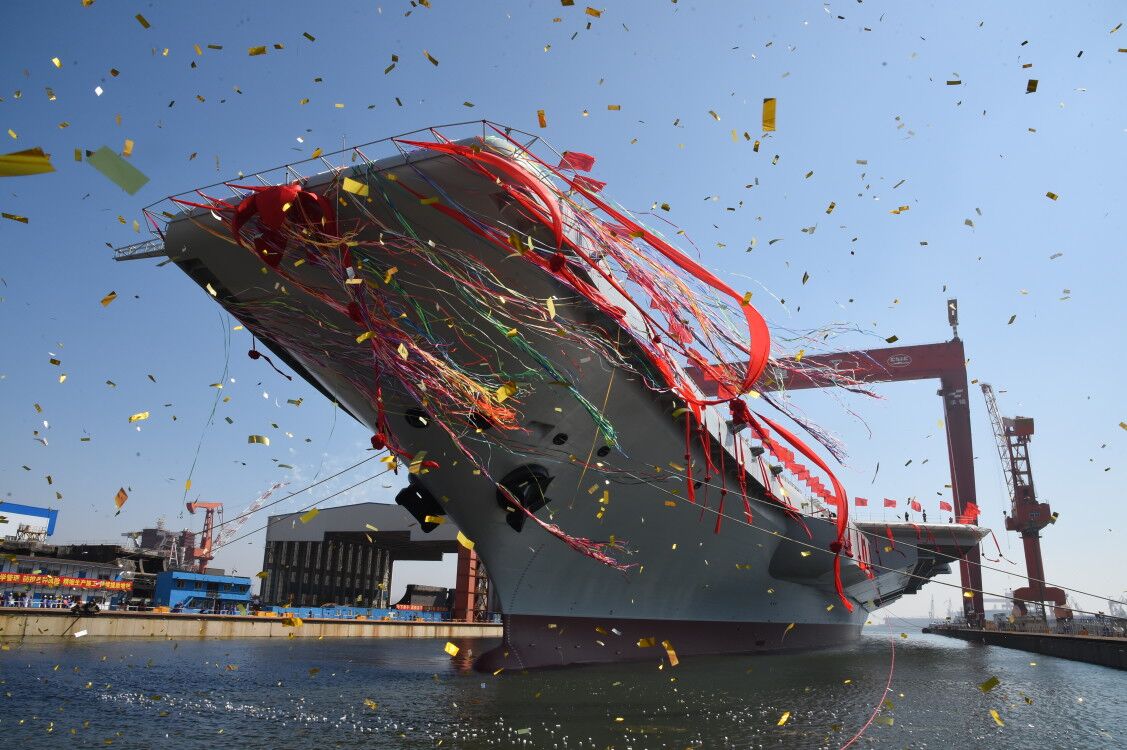Expert: U.S. Should See China as ‘Number One’ Adversary, Not Trading Partner

China’s Type-001A Carrier following its launching ceremony on April 26, 2017. Ministry of National Defense Photo
The People’s Republic China needs to be seen by the United States as its principal potential adversary in the years ahead, not as a commercial partner that America cannot live without, a leading expert on maritime issues said Wednesday.
Answering an audience question at the Heritage Foundation in Washington, D.C. Seth Cropsey, director of seapower programs at the Hudson institute, said, “China should be our Number One concern; it’s not.” He added that Chinese leaders want to restore it to the status of a great state, overcoming a 19th and early 20th-century history of European imperialism, “not only at sea, but especially at sea. They’ve invested a lot in satellite technology, in cyber technology, building a fleet” that potentially could be larger than the United States’ in the not-too-distant future.
[http://www.heritage.org/defense/event/seablindness-how-political-neglect-choking-american-seapower-and-what-do-about-it]
Cropsey, the author of Seablindness: How Political Neglect is Choking American Seapower and What to Do about It, said, the Chinese “have their own way of looking at things” from their island-building campaign to their use of “lawfare,” to bolster territorial claims in the East and South China Seas and disregard international court rulings when those claims are rejected. He said President Donald Trump was correct in judging Beijing’s commercial policies. “They’re mercantilists, not free traders.”
While China’s close neighbors say how important their economic and commercial ties to Beijing are for their own development, privately they are very concerned about its increasingly assertive behavior on their borders. Cropsey said out of the limelight and away from microphones they say, “if you guys [the United States] get out … if China becomes the hegemon, they will treat us like dogs” as it did in the past when it was a great power.
In his remarks before the question-and-answer session, he said, “I wish I could be optimistic about the future” of the challenges facing the United States not only from a transoceanic Chinese navy, but as it concerns Russian behavior in the Baltic and Black Seas, Iran’s continuing development of anti-ship weaponry and the tolls the continuing wars in the Middle East and Afghanistan are taking on the fleet and the Marine Corps.
Trying to meet the combatant commanders’ requirements for presence that call for 370 to 400 ships with the 276 ships now in the fleet “is an exercise in futility” and leads to accidents such as the ship collisions suffered in U.S. 7th Fleet. Cropsey said 350 ships “is the absolute bare minimum to meet [today’s] requirements.” He pointed out the administration’s call for a fleet that size is to be built over 30 years and “it doesn’t provide the immediate kind of relief that is necessary” to reduce today’s high operating tempo.
As to the additional $50 billion more in the coming year’s defense program over this year’s, he said much of the money that will go to the Department of the Navy is earmarked for repairs, maintenance and fixing shipyards and port facilities not shipbuilding.
Several times in his remarks and answers, Cropsey said it takes “political will and political judgment” in the executive branch and Congress to provide for national security, even as they have to address the current unexpected hundreds of billions in costs that will be associated with recovery from Hurricanes Harvey and Irma.
“These judgments go back to money.”
He called for a “mix of less technologically-stuffed ships” to be put into the construction program. “Our ships are being built as more and more complex systems,” he said in answer to a question. That also means “changing the way we fight,” employing more unmanned systems in air, on the surface and underwater and inviting more “cooperation and coordination with private industry than is expected of operators today.”
Crospey said in answer to follow-up questions on whether Defense Secretary James Mattis understands the Department of the Navy’s long-term investment needs he said, “If he doesn’t, who does?” As to the roles of the service secretaries, he said Mattis views them as “administrative officials who are there to make sure direction from the top is carried out [and] conducted in a professional way.”
Cropsey said another change from those Cold War days is how the Navy views its role. He said the Navy appears to be adopting a direction of moving away from power projection to sea control with the exception of the South China Sea.
No comments:
Post a Comment